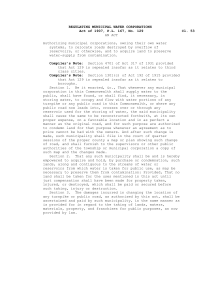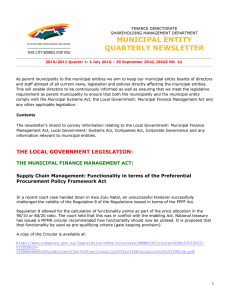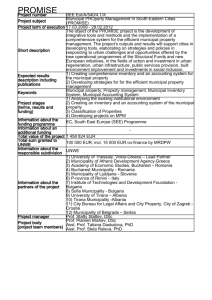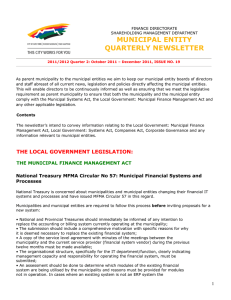DRAFT LONG-TERM FINANCIAL PLAN POLICY Budgets FINANCE DEPARTMENT
advertisement
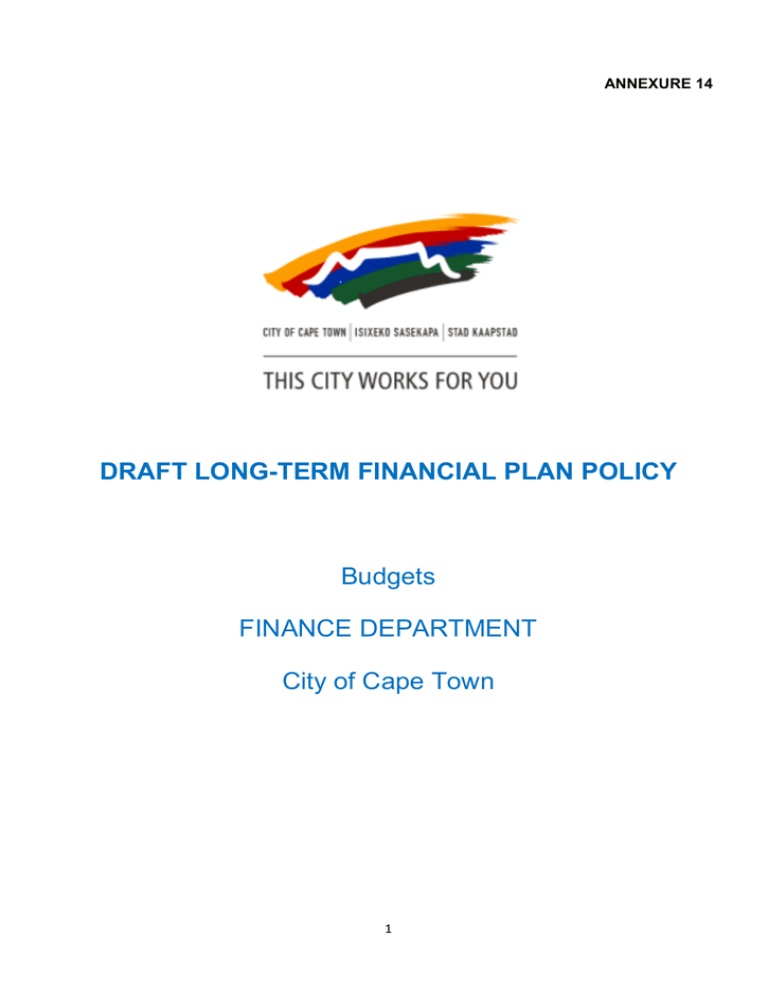
ANNEXURE 14 DRAFT LONG-TERM FINANCIAL PLAN POLICY Budgets FINANCE DEPARTMENT City of Cape Town 1 Document Information and Revision Log File Name Long-Term Financial Plan Policy Original Author (s) CoCT Current Revision Author (s) Next Review Date Version Date Authors Revision Notes 1 November 2012 CoCT: Budgets Draft 2 February 2013 CoCT: Budgets Draft 2 Approval of Policy Please note that the implementation of the policy contained in this document is subject to approval and signing off by all relevant Heads and/or Committees, including but not limited to: Executive Director : Finance Portfolio Committee : Finance MAYCO Council 2 TABLE OF CONTENTS 1. DEFINITIONS AND ABBREVIATIONS ...................................................................... 4 2. INTRODUCTION ....................................................................................................... 5 3. PROBLEM STATEMENT ........................................................................................... 5 4. PURPOSE ................................................................................................................. 5 5. GUIDING PRINCIPLES ............................................................................................. 6 6. ROLE PLAYERS AND STAKEHOLDERS ................................................................. 6 7. REGULATORY CONTEXT ........................................................................................ 7 8. POLICY DIRECTIVE DETAILS .................................................................................. 8 9. EVALUATION AND REVIEW ................................................................................. 122 3 1. DEFINITIONS AND ABBREVIATIONS ‘‘basic municipal service’’ means a municipal service that is necessary to ensure an acceptable and reasonable quality of life and which, if not provided, would endanger public health or safety or the environment; “BSC means Budget Steering Committee, a committee established to provide technical assistance to the Mayor in discharging the responsibilities set out in section 53 of the MFMA; ‘‘budget-related policy’’ means a policy of a municipality affecting or affected by the annual budget of the municipality, including— (a) the tariffs policy which the municipality must adopt in terms of section 74 of the Municipal Systems Act; (b) the rates policy which the municipality must adopt in terms of legislation regulating municipal property rates; or (c) the credit control and debt collection policy which the municipality must adopt in terms of section 96 of the Municipal Systems Act; “CITY” means City of Cape Town; “IDP” means the Integrated Development Plan; “LTFP” means Long Term Financial Plan; ‘‘long-term debt’’ means debt repayable over a period exceeding one year; “MBRR” means the Municipal Budget and Reporting Regulations; “MFMA” means the Municipal Finance Management Act No 56 of 2003; “MTREF” means Medium Term Revenue and Expenditure Framework, as prescribed by the MFMA. It sets out indicative revenue and projected expenditure for the budget year, plus two outer financial years; ‘‘municipal tariff’’ means a tariff for services which a municipality may set for the provision of a service to the local community, and includes a surcharge on such tariff; ‘‘municipal tax’’ means property rates or other taxes, levies or duties that a municipality may impose; ‘‘National Treasury’’ means the National Treasury established by section 5 of the Public Finance Management Act. “Short Term” refers to a period up to 3 (three) years “Medium Term” refers to a period between 3 (three) and 5 (five) years “Long Term” refers to any period longer than 5 (five) years 4 2. INTRODUCTION 2.1 The Local Government: Municipal Finance Management Act No 56 of 2003 (hereafter MFMA) has instituted various financial reform measures. Sound financial management practices have been identified as essential to the longterm sustainability of municipalities. In this regard the MFMA necessitates that municipality’s must have a policy related the Long Term Financial Plan (hereafter LTFP). 2.2 A municipality’s financial plan integrates the financial relationships of various revenue and expenditure streams to give effect to the Integrated Development Plan (hereafter IDP). It provides guidance for the development of current budgets and assesses financial impacts on outer years’ budgets by incorporating capital expenditure outcomes, operating expenditure trends, optimal asset management plans and the consequential impact on rates, tariffs and other service charges. 2.3 The City has developed a financial model that aims to determine the appropriate mix of parameters and assumptions within which the city should operate to facilitate budgets which are affordable and sustainable at least 10 years into the future. In addition, it identifies the consequential financial impact of planned capital projects on the municipality’s operational budget. 3. PROBLEM STATEMENT 2.1. Preceding the inception of the MFMA municipal budgets usually catered for immediate demands with little or no view to future needs or the future consequences of particular decisions. This poor planning practice fragmented the sustainability of municipal budgets. 4. PURPOSE 3.1 The policy aims to ensure that all long-term financial planning is based on a structured and consistent methodology thereby ensuring long-term financial affordability and sustainability. 5 5. GUIDING PRINCIPLES 5.1 The policy is based on the following principles:(a) Future financial sustainability; (b) Optimal collection of revenue, taking into consideration the socio economic environment; (c) Optimal utilisation of grant funding; (d) Continuous improvement and expansion in service delivery framework, and (e) 6. Prudent financial strategies. ROLE PLAYERS AND STAKEHOLDERS The following role players will ensure that the LTFP is implemented in accordance with the prescribed legislative requirements and Council processes. 6.1 Budget Office (a) Responsible for the preparation and the compilation of the LTFP; (b) Responsible for overall oversight; (c) Present long term financial plan outcome to the Budget Steering Committee; (d) Review Policy and Strategy, in consultation with relevant stakeholders, to ensure maximum compliance in terms of legislation 6.2 Directorates and Departments (a) Responsible for providing reasons on past performance outcomes (b) Responsible for providing information to Budget Office to update the financial plan; (c) Required to identify revenue and expenditure plans for both operating and capital budgets for at least 3 years. (d) 6.3 Required to make recommendations on future service delivery matters Budget Steering Committee (a) Responsible for providing strategic guidance on matters relevant to the long term financial plan (b) Responsible for endorsing the projected MTREF assumptions and parameters contemplated by the LTFP. 6 7. REGULATORY CONTEXT 7.1 Section 17 (3) of the MFMA states that “when an annual budget is tabled it must be accompanied by amongst other “any proposed amendments to the budget-related policies of the municipality”. 7.2 Section 21 of the MFMA states that the mayor of a municipality must at least 10 months before the start of the budget year, table in the municipal council a time schedule outlining key deadlines for, amongst other: (ii) the annual review of— (aa) the integrated development plan in terms of section 34 of the Municipal Systems Act; and (bb) the budget-related policies; (iii) the tabling and adoption of any amendments to the integrated development plan and the budget-related policies; and (iv) any consultative processes forming part of the processes referred to in subparagraphs (ii) and (iii). 7.3 Section 7 (1) of the Local Government: Municipal Finance Management Act, 2003, Municipal Budget and Reporting Regulations, 2009 (hereafter MBRR) states that: “the Municipal Manager of a municipality must prepare, or take all reasonable steps to ensure the preparation of budget-related policies of the municipality, or any or any necessary amendments to such policies, in accordance with the legislation applicable to those policies for tabling in the municipal council by the applicable deadline specified by the mayor in terms of section 21 (1)(b) of the MFMA”. 7.4 Section 7 (1) reference (1) of the MBRR, further states that “as defined in section 1 of the MFMA. Policies that affect or are affected by the annual budget of a municipality include ….“(g) a policy related to the long term financial plan”. 7.5 Section 4 (1) of the MBRR states “that the mayor of a municipality must establish a budget steering committee to provide technical assistance to the mayor in discharging the responsibilities set out in section 53 of the MFMA”. 7 7.6 Section 26 (h) of the Local Government: Municipal Systems Act 32 of 2000 (hereafter the MSA) states that “An Integrated Development Plan must reflect a financial plan, which must include a budget projection for at least the next three years”. 8. POLICY DIRECTIVE DETAILS 8.1 Financial strategies 8.1.1 An intrinsic feature of the LTFP is to give effect to the City’s financial strategies. These strategies include: (a) Increasing funding for asset maintenance and renewal; (b) Continuous improvement to the financial position; (c) Ensuring affordable debt levels to fund the capital budget; (d) Maintaining fair, equitable and affordable rates and tariff increase; (e) Maintaining or improving basic municipal services; (f) Achieving and maintaining a breakeven/surplus Operating budget; and (g) Ensuring full cost recovery for the provision of internal services. 8.2 Non – financial strategies 8.2.1 The LTFP is a key component for achieving the goals listed in the IDP of the City. The LTFP must consider the following non – financial strategic strategies: 8.3 (a) The City’s Strategic Focus Areas; (b) Infrastructure led growth strategies; and (c) The City’s Spatial Development Framework. Preparation of the LTFP 8.3.1 The LTFP process should commence by latest June of each year. 8.3.2 The LTFP should consider the fiscal overview by reviewing past financial performance, projection of long-term financial outlook and financing and funding arrangements. The following matters should be considered annually: 8 (a) Revising the long-term financial plan for events that may have impacted during the recent past; (b) Assessing the outcomes and achievements of the past few years financial performance as per the audited financial statements; (c) Reviewing the financial objective and assumptions; (d) Reviewing the past and summarise long term financial outlook; (e) Assess the current overall financial position and liquidity situation; (f) Identify any financial challenges and constraints; (g) Identifying strategies to deal with the challenges, and to maintain financial viability and capacity to sustain services; (h) Identify overall funding mix and implications for own revenue and external funding; and (i) Assess compliance with the MFMA and other relevant legislation etc. 8.3.3 The LTFP is prepared in an uncertain environment it is therefore required to make certain assumptions. Assumptions on the following internal and external factors must be made: (a) Reviewing the external factors (population migration, employment, health, development of businesses, and new residential areas, etc.); (b) General inflation outlook and its impact on the municipal activities; (c) Credit rating outlook; (d) Interest rates for borrowing and investment of funds; (e) Rates, tariffs, charges and timing of revenue collection; (f) Growth or decline in tax base of the municipality; (g) Collection rates for each revenue source; (h) Price movements on specifics e.g. bulk purchases of water and electricity, fuel etc; (i) Average salary increases; 9 (j) Industrial relations climate, reorganisation and capacity building; (k) Trends in population and households (growth, decline, stable); (l) Changing demand characteristics (demand for services); (m) Trends in demand for free or subsidised basic services; (n) Impact of national, provincial and local policies; (o) Ability of the municipality to spend and deliver on the programmes; and (p) Implications of restructuring and other major events into the future. 8.3.4 Intergovernmental fiscal transfers/allocations from National and Provincial government play a pivotal role in the finances of the City. The following unconditional transfers/allocations must be considered, as a minimum, when projecting the budget: (a) Local Government Equitable Share; (b) Fuel levy; and (c) Grants related to the provision of Provincial government functions. 8.4 The City’s LTFP model and scenario planning 8.4.1 The City financial model gives effect to the LTFP. It enables the forecasting of the operating and capital budgets for at least 10 years into the future. The model embodies National Treasury’s budget preparation guidelines, drawing on assumptions and parameters to forecast the operating budget. 8.4.2 Strategic initiatives should be prioritised and quantified to be included in the financial model. 8.4.3 The financial forecasting model must be updated using the fiscal overview, assumption and intergovernmental fiscal transfers/allocations information to identify immediate opportunities and/or risks. 8.4.4 The medium and long-term financial viability should be evaluated. 8.4.5 Reiterative scenario planning should be executed to ensure optimum use of resources to cater for strategic initiatives. 10 8.4.6 To identify the optimum balance between revenue collection and municipal spending the following should be taken into account: (a) The impact each scenario has on the financial sustainability and affordability of the City; (b) Whether scenario’s are realistic in terms of revenue projections; (c) Potential revenue enhancement strategies which may have a long-term impact on the revenue base of the City; (d) Potential cost saving mechanisms related to strategic initiatives; and (e) The impact of infrastructure investments and maintenance programs on future revenue streams. 8.4.7 Presentations on scenarios should be presented to the BSC as may be requested. 8.4.8 BSC should endorse the final MTREF scenario inclusive of assumptions and parameters annually by latest January. 8.5 The annual updated LTFP should identify the following: 8.5.1 Assumptions and parameters to be used to compile the Operating and Capital budgets over the next MTREF; 8.5.2 Future Operating revenue and expenditure projections based on assumptions and parameters; 8.5.3 Future affordability of projected Capital Plans 8.5.4 The level of infrastructure development required to achieve the Municipal priorities, within the funding restrictions; and 8.5.5 8.6 External funding requirements in respect of long term debt. Implementation of the LTFP 8.6.1 The annual updated LTFP should provide the parameters and assumptions for the compilation of the operating and capital budgets for the next MTREF. 8.6.2 This information should be provided to the Operating and Capital budget departments by latest January of each year. 11 9. EVALUATION AND REVIEW 9.1 This policy shall be implemented once approved by Council. 9.2 In terms of section 17(1) (e) of the MFMA this policy must be reviewed on an annual basis 9.3 Changes in financial strategy, non – financial strategic strategies and legislation must be taken into account for future amendments to this policy. 9.4 Any amendments must be tabled to Council for approval as part of the budget process. 12
